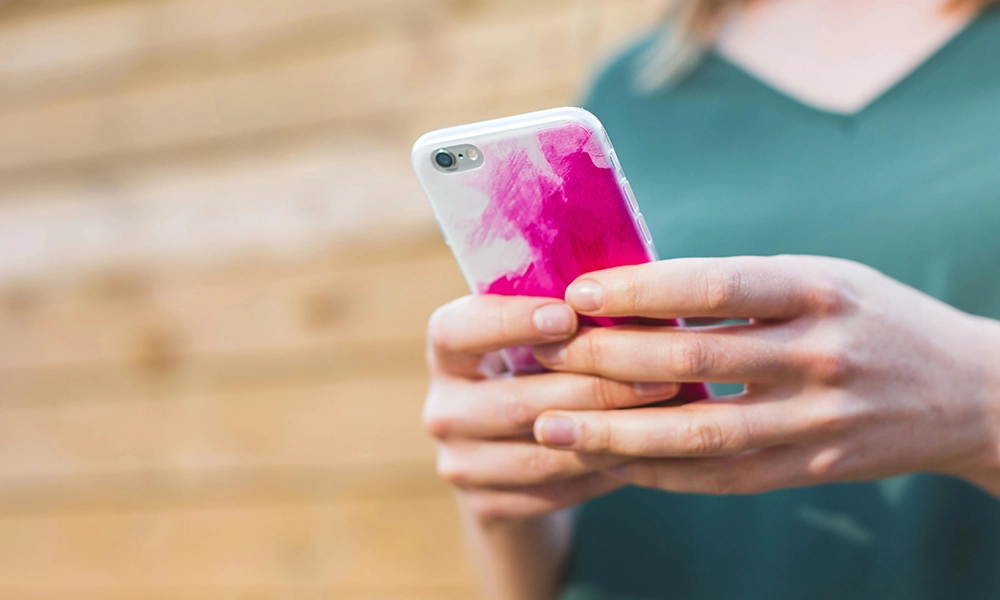Isle Of Dogs resident Lizzie Aaryn-Stanton found herself spending more than nine hours on her device and decided to create an app to coach people in similar situations

Subscribe to our free Wharf Whispers newsletter here
“During lockdown, I was averaging nine and a half hours a day of screen time on my phone, mostly on Instagram,” said Isle Of Dogs resident Lizzie Aaryn-Stanton.
“I was posting, then constantly checking for likes and affirmations.”
The portable communications devices that have become a seemingly essential part of modern life have a darker side to them.
We live in an attention economy.
The enormous organisations that create and hone the apps we stuff our phones with want our time and our eyes – not because they’re really keen to improve our lives, but to show us as many adverts as efficiently as possible.
To do this, teams of developers work tirelessly to design better and better ways to keep us looking, with one of their most powerful tools being simple counters.
The work of creating posts is not rewarded financially, in the main, but instead via something much less tangible – engagement.
The social media companies know it feels good to be seen and keep users hooked by showing how many likes, views and shares their post has attracted.
It’s fun, exciting even. You can watch in real time.
But it’s also a system of diminishing returns.
Over time our brains get used to the little pops of dopamine released when we imagine the positive thoughts of others as those counters tick upwards.
Eventually, our heads get wired to those numbers and the rewards they create in our brains. We need them just to keep functioning and our phones are there to feed us more and more of what we crave.
We sit there anxiously refreshing our screens desperate for the smallest indication that someone has noticed us or something we’ve done.
It’s available all day, every day at the tap of a screen and it’s free.
Little wonder, really, that many people struggle to have a healthy productive relationship with a device that ironically was conceived to ease our lives through communication.

recognising the problem
Lizzie knew what was happening to her wasn’t healthy.
Spending an average of 66 hours or more a week was taking its toll and she decided she wanted to do something about it, not just for herself but for other people too.
“I was absolutely miserable at that time,” she said.
“I would turn my phone off or put it in a drawer and then, five minutes later, I’d be checking something on it again.
“There was no need at all, but I was going back time after time, re-editing images on Instagram.
“It was deeply vain and it came from a lack of self-worth – something I was trying to get from my phone but that it was never going to give me.
“I’ve been an actress for the last decade and so at the time of my phone addiction, I saw posting on social media as part of my career.
“There was a lot of TikTok in those nine and a half hours as well and I realised scrolling through videos had even more of a grip on me than Instagram.
“I knew that was really something I shouldn’t do.”

creating KintsÜgi
Determined to break the cycle, Lizzie started by Googling advice on how to get off her phone and began trying things out.
“As an actress, I’ve always been good at inventing games and exercises to help actors unlock characters,” she said.
“Whenever I need to do that, I’ll find a way to make it fun.
“I was having all these ideas about how it might be possible to help others in similar situations.
“Then I realised that I needed to create something on the phone itself so people could reshape their relationship with the device.”
This was the genesis of Lizzie’s creation, KintsÜgi, a recently released app that aims to coach users on establishing and nurturing healthier phone behaviours.
Before going into more depth on the software, first a bit of context.
“I’ve done a lot of deeper work into addiction since I started this journey and I’m not marketing the app as a cure for addicts,” said Lizzie.
“I am an addict of multiple forms and I realise now that the phone was an accessory for a deeper issue – a love addiction.
“I’ve completed the 12 steps through Sex And Love Addicts Anonymous and am doing the 12-step programme with Co-Dependents Anonymous, both of which are based on the AA model.
“I had a break-up in 2022 that brought me to my knees.
“I was only with the guy for a month, but it took me a year and a half to heal from that relationship.
“I was convinced that he was the person I was going to marry and have kids with – that it was going to be all ‘happy-ever-after’.
“I was caught up in very binary, love addict thinking.
“I began working with a therapist who helped me realise that I was addicted to the feeling of falling in love.
“Flash forward and I understood that my Instagram use was a way for me to get little hits of love when I didn’t have somebody to fall in love with.
“Unlike other addictions like alcohol or drugs, as a love addict you’re forced into withdrawal more often than you’d like to be because you can’t control other people.
“I was using social media to help deal with that.
“Through therapy, I’ve gained a deep understanding of who I am.
“Doing the 12-step programmes has also given me knowledge of how addictions are formed and why we’re addicted to things but also how to get yourself back to a place where you can start to put your life back together again.
“That’s how the name of my app – KintsÜgi – came about.
“It takes its name from the Japanese art of repairing broken pottery with gold.
“When a bowl smashes, it’s a very slow process, because you have to put one bit back at a time, paint it gold and then move on to the next bit until you’re finished.
“Eventually the idea is that the end result is more beautiful because of that healing journey.”

not a programme of abstinence
The contrast for Lizzie is that fighting many forms of addiction involves abstinence.
However, in the same way she’s not shutting herself off from personal relationships, KintsÜgi’s aim is to change its users’ interactions with their phone.
Following a seven-day free trial, the programme costs £5.99 per month and offers users daily tasks and challenges with the intention of helping them achieve this outcome.
“When I was glued to my phone, I turned first to my device for help and then started writing notes on it,” said Lizzie.
“That’s why I knew this had to be on the phone.
“My dad’s in Kenya and my mum’s in Spain, so, without my it, I wouldn’t have a decent relationship with them.
“When users log in there’s a three-part Welcome Pack and the first thing to do is to get a pen and a notebook and start being nice to yourself.
“When people are locked into problematic behaviour, they’re often at their lowest – at or close to rock bottom.
“When you’re there, the person you hate most is yourself and you can’t start a healing journey unless you start to change that.
“Then we go into a week of changing how you react to your phone.
“There are visual things, like cleaning your screen, turning off notifications and changing the ways it steals your attention.
“Then there are some pretty tough habits that I encourage people to adopt such as keeping their phones hidden, not wearing them and never having them on the table when eating or in public.
“Then there’s sleeping with your phone out of the bedroom.
“Watching the screen before you go to bed is not helpful for rest.”

how KintsÜgi works
After completing the three-day Arrive sessions, users move on to seven days of Reframe followed by seven days of Retrain to complete the Welcome Pack.
They are then free to explore the app’s other content, with packs created by Lizzie to help address myriad issues.
She said: “Wherever you are and whatever pack you’re on there’s either a written lesson or a voice note from me setting a challenge for the day.
“That might be about reconnecting to yourself or engaging with an offline hobby.
“There are packs that cover working from home, the maintenance of good habits, gambling, adult content and social media.
“Realistically, our phones are the gateway to a lot of problematic behaviours. How people progress within the app is up to them and what they need.
“Ultimately KintsÜgi is a way for people to get to know themselves a bit better. It starts as a way to get off your phone, but the benefits are wider than that.
“The people I want to reach are those who need it most, to stop living the rat race, nine-to-five, and take time for themselves.
“The first thing to do is to write out the positive and negative things about your phone.
“Then it’s about how we can relate to ourselves and each other in a healthy way so we don’t need it to fill the gap.”
key details: KintsÜgi
KintsÜgi is available to download for Android and IOS phones.
The app offers a seven-day free trial with a £5.99 subscription allowing access to all content thereafter.
Find out more about the app here
Read more: Malaysian restaurant Ong Lai Kopitiam to open its doors at Harbord Square



